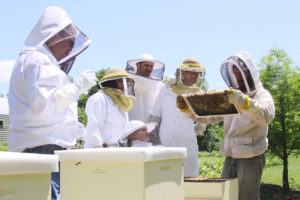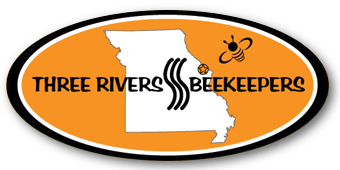Why Become a Beekeeper?
 Honey bees are fascinating creatures and can provide hours of enjoyment watching them come and go as they pollinate the surrounding flowers, shrubs, and trees. That alone is all some people want from the beekeeping hobby. But of course, many hobbyist beekeepers also enjoy another benefit provided by the honey bees … honey! A fully producing hive can provide anywhere from 50 to 200 pounds of honey in a season!
Honey bees are fascinating creatures and can provide hours of enjoyment watching them come and go as they pollinate the surrounding flowers, shrubs, and trees. That alone is all some people want from the beekeeping hobby. But of course, many hobbyist beekeepers also enjoy another benefit provided by the honey bees … honey! A fully producing hive can provide anywhere from 50 to 200 pounds of honey in a season!
If you would like to become a beekeeper, the best way to get started is to attend our monthly Meetings! We have lots of experienced beekeepers who are happy to help!
Beekeeping Methods
Beekeeping can range from simple, “minimalist” methods, all the way to commercial operations with hundreds of hives. It’s a good idea to do a little research before getting started and understanding exactly what you want out of beekeeping. You can then be directed to the most suitable equipment and methods. It’s generally a good idea to start small and simple.
Keeping Bees in the City
Most municipalities allow a few hives on your property and, due to the well-publicized decline of the honey bee population, more and more areas are relaxing rules against honey bee hives. Check your local ordinances.
Bee Stings
Stings happen on occasion. However, it’s usually due to negligence on the part of the beekeeper and putting the bees in a situation where they feel they need to defend themselves. Frankly, if you’re a beekeeper, it goes with the territory. Over time, a sting here and there is to be expected and really doesn’t hurt that much!
Beekeeping Equipment and Supplies
There are a number of beekeeping equipment suppliers. A simple Google search for “beekeeping equipment” will give you a list of several dozen small and large suppliers. There are about a half-dozen major suppliers. Contact us and we’ll be happy to point you in the right direction. Many of these same suppliers also sell honey bee starter packages, queens, and nucleus hives. Also, there are many local beekeepers that can supply nucleus hives and queens.
When to Get Started
The springtime is generally best. Ideally, you should have your hives assembled and ready to occupy honey bees sometime in April. Later in the year is OK, but the later in the summer you start the less time your new colony will have to build sufficient strength and resources to survive the long winter. The autumn months are never a good time to start a new colony. However, it’s a great time to start reading beekeeping books and preparing for a spring start.
Recommended Reading:
- “The Beekeeper’s Handbook” by Diana Sammataro
- “Beekeeping for Dummies” by Howland Blackiston
- “The Backyard Beekeeper” by Kim Flottum
- “First Lessons in Beekeeping” by Keith S. Delaplane
- “Nature’s Little Wonders: Bees” by Candace Savage
- “Honeybee: Lessons from an Accidental Beekeeper” by C. Marina Marchese
- “Robbing the Bees” by Holley Bishop
